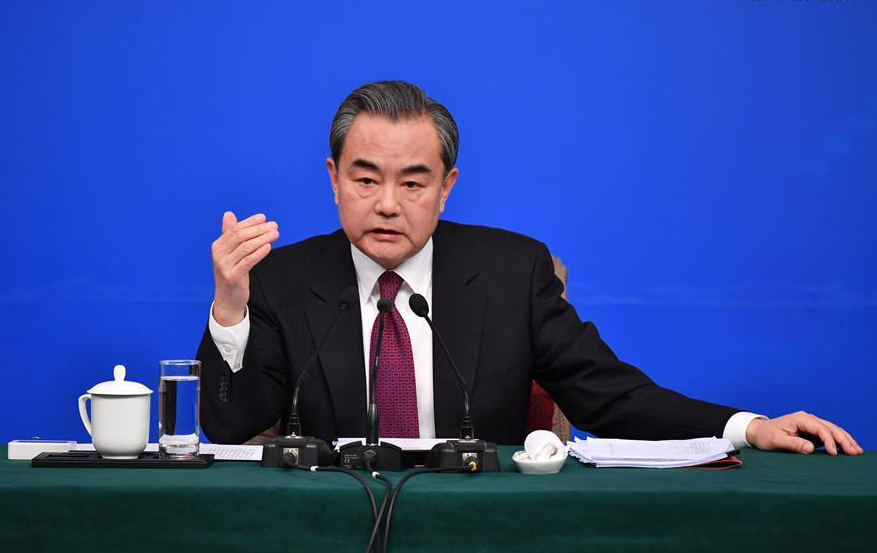Media Report

- The Washington Post reports: "China's foreign minister has a plan to ease tensions in East Asia: North Korea should stop testing missiles, and the United States and South Korea should stop joint military exercises, he said Wednesday. The comment was delivered at a news conference in Beijing two days after North Korea test-fired four missiles and the United States and South Korea began deploying a new missile defense system that Beijing opposes, raising regional tension and renewing questions about Asia policy under President Trump. 'China's suggestion is, as a first step, for North Korea to suspend nuclear activity, and for the U.S. and South Korea to also suspend large-scale military drills,' Chinese Foreign Minister Wang Yi said. The plan, he said, could get all sides back to the negotiating table. Wang warned that the United States and North Korea appear headed for a collision. 'The two sides are like two accelerating trains coming toward each other with neither side willing to give way,' he said. 'The question is: Are the two sides really ready for a head-on collision? Our priority now is to flash the red light and apply the brakes on both trains.' "
- The Wall Street Journal reports: "China posted its first trade deficit in three years last month, driven by higher commodity prices, an unexpected drop in exports and the effect of the Lunar New Year holiday. February's $9.15 billion deficit surprised analysts and market watchers, many of whom had expected China's usual run of trade surpluses to continue. The country's previous monthly trade gap was in February 2014, totaling nearly $23 billion. Imports surged 38.1% last month in dollar terms from a year ago, compared with 16.7% growth in January, China's customs administration reported Wednesday. Economists attributed the bump to rising prices for oil, ores and other commodities...The Shanghai Composite Index fell after the release of the data before recovering to end the day flat. Adding to the confusing signals was that a day earlier China reported its foreign-exchange reserves rose back above $3 trillion after having fallen for more than half a year...Behind February's surge in imports was a combination of higher commodity prices and stronger domestic demand, economists said. China is in the midst of an infrastructure-building spree and prices of oil, copper, steel and other raw materials have shot up in recent months. Iron-ore prices have increased 84% and crude oil is up 60% year to date."
- The National Interest comments: "[China's] terms of trade have deteriorated significantly over the past two decades. This is not simply a function of the appreciation of the yuan, but a more basic change in the cost of doing business in China...China was rapidly losing its comparative advantage to nations such as South Korea, Vietnam and Mexico due to rising wages and steady internal inflation. Today, China's labor costs are only 4 percent cheaper than those in the United States when productivity is factored in, according to Oxford Economics...As the new government of Donald Trump engages with Beijing in areas such as trade and economics, Washington needs to appreciate that the economic situation in China is changing rapidly and has significant political ramifications. Rising wages and prices are eliminating China's relative advantage in the global competition for investment and production, while higher productivity nations, such as the United States, are actually becoming more alluring. One need only observe the growing flow of direct investment from China to other nations in Europe, Latin America and North America to understand that the People's Republic is no longer as attractive a destination for capital as it was two and three decades ago."
Calendar
- 2017-03-07 China warns of ‘consequences’ over deployment of U.S. antimissile system
- 2017-03-06 North Korea tests four more missiles — and China’s patience
- 2017-03-05 China overtakes eurozone as world's biggest bank system
- 2017-03-03 China Is Running Out Of Cheap Rural Labor And It's Because Of Failed Reforms
- 2017-03-02 How Trump could find common ground with China, thanks to the Islamic State
- 2017-03-01 Economic Coercion, with a Chinese Twist
- 2017-02-28 'The president always gets something': Spicer suggests Trump gained concession from China
- 2017-02-27 1st senior Chinese official visits Washington in Trump era
- 2017-02-26 For More Chinese Firms, It Pays to Make It in the USA
- 2017-02-24 China hits back at Donald Trump's 'champion of currency manipulation' jibe
News
- The Washington Post China wants to avert 'head-on collision' in the Koreas, but will Trump sign on?
- The Wall Street Journal China's Three-Year Run of Monthly Trade Surpluses Hits Surprising Wall
- Bloomberg China's Capital Controls Trigger Backlash as Deals Thwarted
- The New York Times As Leaders Argue, South Korea Finds China Is No Longer an Easy Sell
- The Wall Street Journal China Bitcoin Withdrawals on Hold, Awaiting Regulators' Approval
- USA Today China's ZTE to pay $892M for violating Iran sanctions
- Reuters Japan must cure its 'anxiety' about China: Chinese Foreign Minister
- The New York Times U.S. Fines ZTE of China $1.19 Billion for Breaching Sanctions
- The Financial Times Asian markets weak ahead of China trade data
- Reuters China posts first monthly trade deficit in three years as imports soar
- The Guardian UK faces €2bn fine over Chinese imports scam, say EU investigators
- BBC Trump trademarks approved by China
- The Financial Times Global investors return to China's bad debt market
Commentary
- The National Interest China May Already Be Losing the Trade War
- Quartz International Women's Day in China is a day to reward your inner "goddess" by shopping online
- Forbes China's Target Growth Rate Might Be Impressive, But It's Also A Liability
- Barron's Japan Tourism Stocks To Buy As China Sanctions Korea
- The Guardian: Opinion I went to jail for handing out feminist stickers in China
- The Diplomat THAAD and China's Nuclear Second-Strike Capability
- Foreign Policy Dalai Lama Interview Fuels New Fire in China-Tibet Spat
